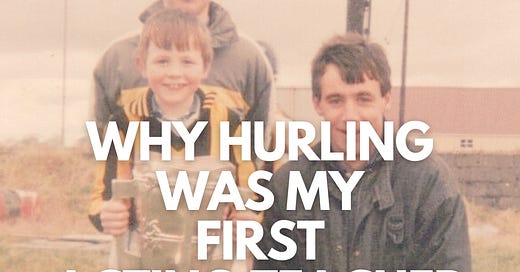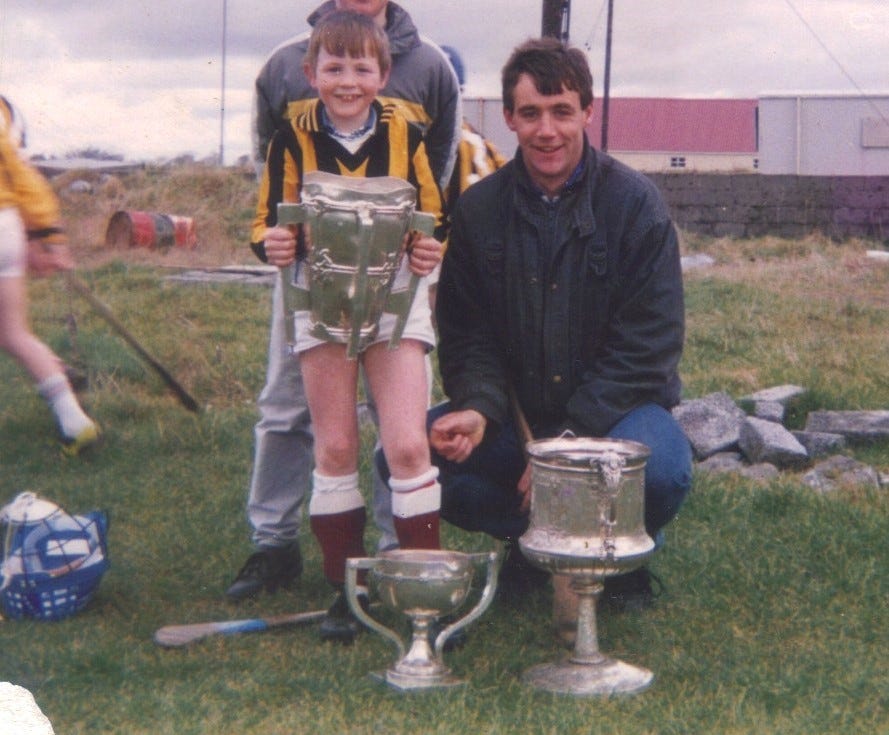There are some things you never forget.
It was circa 2001. I was sitting in the front of a black Ford Mondeo looking out onto a rain-soaked field.
In between the motion of the window wipers, a couple of team-mates and I were squinting out onto the second half of a match between two teams whose names escape me.
We were due to play afterwards in the Intermediate championship. There was a unanimous decision there was no point freezing our you-know-whats off in a fridge freezer of a dressing room. So, we sat back to see what the game had to offer.
It wasn’t a classic by any stretch. But our small talk zoned in on a number six - the centre back - for one of the teams. He was the standout hurler on a Galway under-18 team full of standout hurlers. They won an All-Ireland title a few years before.
A fine strapping lump of a young fella. With a reputation to match.
But you wouldn’t have known that by the way he played on this day.
Guy in the back: What’s the story with that number six?
Other guy in the back: He was playing unreal stuff there a year or two ago.
Driver: Someone told him he was a good hurler and he believed him.
As soon as those words punched the air, my head spun, but my brain was still processing.
I repeated it to myself again, just to be sure I heard it right.
What added weight to the words was the mouth they came out of. These weren’t the half-baked remarks of some hurler on the ditch.
This was Pat Malone.
One of my sporting heroes, a two-time All-Ireland winner and the driver of said Mondeo.
But more about him later.
The Baboon
“He who understands the baboon would do more toward metaphysics than Locke.”
Charles Robert Darwin wasn’t trying to increase his follower count when he posted this thought to his private notebook in August 1938.
That idea was born seven years earlier aboard the good ship Beagle, which was attempting to accurately chart the coast of South America and conduct a series of measurements while sailing around the world.
Most of us recall Darwin for his work on the evolution of our species. But, when he boarded Beagle in December 1831, all he cared about was the field of geology and trying to understand the earth.
As described by Robert T. Keegan in the book Creative People at Work: “The development of a creative thought form is a two-step process. First, the thinker acquires expert knowledge in a field. Second, he or she applies the expert knowledge in the attempt to understand new areas – to use the expert knowledge as a basis for analogy.”
While travelling on Beagle, Darwin made some ground-breaking discoveries about the formation of coral reef. He then used that as a prism to later arrive at a deeper understanding of the evolution of the likes of you and me.
In later years, he would write: “The voyage of Beagle has been by far the most important event in my life and has determined my whole career.”
Now, don’t get me wrong. I’m not suggesting I’m some sort of Darwinian hurling expert. Far from it. But I was obsessed with hurling from as far back as I can remember. Right up to the age of 32, when I packed it in, the game was never far from my thoughts.
Until I wandered into an acting class, that is. Then I basically swapped one obsession for another.
Two completely different fields though, right?
Not quite.
The Call
I was nothing special as a hurler. But I have huge regrets from my hurling days.
So, I began to ask myself, what did I learn from hurling that I can maybe apply to acting?
First off, I attached my self-worth to my performances as a hurler, which fluttered up and down more than a crypto currency. If I played well at the weekend, my mood for the week was sky high. If I had a bad game, my mood for the week was laid low. And there were plenty of bad games.
I was riddled with insecurities, too. What do my team-mates think of me? Does the manager really rate me? Will people ever talk about me as a hurler the way people still talk about my father as a hurler?
I was desperate for someone to tell me I was a good hurler.
I remember when I joined St. Vincent’s in Dublin from my home club, Oranmore-Maree, in Galway. In my first few games on the senior team, I was playing well. More than playing well, I was shooting the lights out. And there was idle talk I might get a run with Dublin.
People were telling me I was a good hurler. And I believed them.
Then, the call came.
A voicemail on my phone from the then Dublin senior hurling manager, Humphrey Kelleher, asking me would I give him a call about attending training.
Boom. This is it. Validation at last. I frantically dialled him back.
One dial tone, then another, then he picked up. I could hear the buzz of training in the background.
Me: Humphrey?
Humphrey: Yes.
Me: Niall Bishop here.
Humphrey: [silence]
Me: Ah….you rang me about coming to Dublin training?
Humphrey: No. Not me.
Me: Ah….
Humphrey: I’m in a bit of a rush here. Thanks for the call.
The beads of cold sweat gathered on my hands and forehead. I sank into the car seat.
I was that mortified I didn’t turn up for Vincent’s training for a week. When I did, the craic started before I even got the car door open:
“Ah, jaysus, would ya look who it is, the county star is back, wha!?”
My initiation into a Vincent’s dressing room full of pranksters was complete.
Me, Myself and I
And for the next seven seasons, all I did was try to prove myself to anyone and everyone. And, in turn, save for a season in 2007, too many of my hurling days were needlessly miserable.
My self-absorption had gradually sucked the life out of the game I loved.
I stopped playing in 2012. I’d signed up for my first acting class and the spark for hurling was gone. There was a step change in my last year playing however - the penny had finally dropped: hurling wasn’t about me.
If I tried to do my bit for the team, the feeling was different. Whether I was in the dugout or the starting fifteen, it didn’t really bother me. If I celebrated my team-mates instead of seeing them as competition or threats, that nauseating feeling in my gut disappeared.
I had finally begun to start to free myself from the disease of me. And it was a huge f*cking relief in the end.
I am determined not to make the same mistake as an actor. To try to be of service to the tribe as a storyteller. To try to serve whatever story I might be part of and those around me. And sure look, the roles, the recognition, the rewards are all out of my hands anyway.
Then, I’m free from being a hostage to envy, comparison, worry. Free from needing someone to tell me I’m good. Free to just do it.
The Homecoming
It’s coming close to 1am in Eyre Square on the 6th of September 1988. By west of Ireland standards, it’s a balmy night. The Galway senior hurling team had won their second consecutive All-Ireland in Croke Park earlier that Sunday and only the fourth title in the county’s long hurling history. The place was mobbed.
I was standing with my brothers and father near the bottom of Prospect Hill, across from where the TK Maxx is now - I could take you to that exact spot today, it’s still that vivid in my mind.
The team bus was wading itself through a sea of maroon and white. How a small child didn’t end up under it I’ll never know.
Anyway, I scanned the bus for one man and one man only - Pat Malone. And there he was. Window seat about half-way back, left-hand side. He smiled and waved.
They say along Main and Elm Street, when President Kennedy’s motorcade was passing through downtown Dallas, the crowds felt JFK and Jackie were looking straight at them.
My nine-year-old self felt ten feet tall.
Fast forward thirty-two years and I’m sitting across from Pat in Poppy Seed coffee shop in Clarinbridge. After relentless prompting, he briefly recalled his days in a Galway jersey: “You know, I was never the best hurler. I really had to work on my touch. But I was lucky to be part of a great group, a great bunch of lads. But, I knew I had to work hard for the team.”
You know, I’ve heard plenty of people acknowledge since Malone was a great hurler back in his heyday.
Even now, he would never believe them.




